

Egypt Through Time: Photographs From 1800-2013. The Pyramids in 1880.
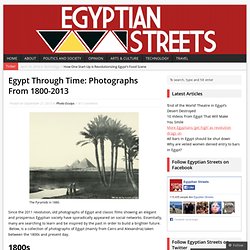
Since the 2011 revolution, old photographs of Egypt and classic films showing an elegant and prosperous Egyptian society have sporadically appeared on social networks. Essentially, many are searching to learn and be inspired by the past in order to build a brighter future. Below, is a collection of photographs of Egypt (mainly from Cairo and Alexandria) taken between the 1800s and present day. A Portrait of the Cairo Liberal as a Military Supporter.
Neither Heroes, Nor Villains: A Conversation with Talal Asad on Egypt After Morsi. [This conversation was recorded on Thursday, 11 July 2013.
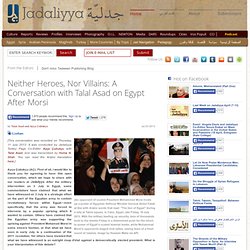
It was conducted by Jadaliyya Turkey Page Co-Editor Ayça Çubukçu with Talal Asad, and was transcribed by Huma N. Shah. You can read the Arabic translation here.] Brand Turkey and the Gezi Protests: Authoritarianism, Law, and Neoliberalism (Part One) Neoliberalism, Illegality, and State of Exception in Turkey The Gezi Park protests, and the state response to them, have crystallized larger dynamics in Turkey.
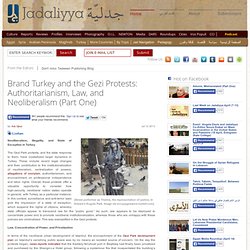
These include recent legal changes and their contribution to the institutionalization of neoliberalism, centralization of powers, allegations of cronyism, authoritarianism, and encroachment on professional independence and labor rights. Overall, these protests offer a valuable opportunity to consider how high-security, neoliberal nation states operate in general, with Turkey as a particular instance.
Unpacking Anti-Muslim Brotherhood Discourse. Noam Chomsky’s Media Control: The Spectacular Achievements of Propaganda argues that effectively crafted and controlled media messages can turn otherwise rational people into “hysterical” warmongers.
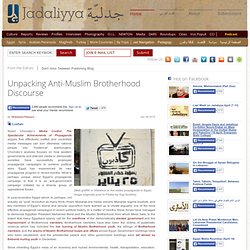
Chomsky’s analysis focuses on how western governments and elite-led media in democratic societies have successfully employed propaganda campaigns to achieve political aims. Egypt has experienced its own propaganda program in recent months. What is perhaps unique about Egypt’s propaganda campaign is that it is an anti-government campaign initiated by a diverse group of oppositional forces. In post-revolution Egypt–which is, perhaps, not actually as “post” revolution as many think–Hosni Mubarak-era media owners, Mubarak regime loyalists, and key members of Egypt’s liberal and secular opposition have teamed up to create arguably one of the most effective propaganda campaigns in recent political history. On Sheep and Infidels. Before I begin, let me state some facts so that when people begin the ad hominem attacks they can try to rein them in within the following boundaries:
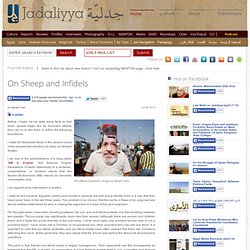
The World According to Beblawi. By Joshua Stacher | published July 11, 2013 - 12:19pm It took a day of back-room negotiations, but the powers behind Egypt’s throne finally settled on Hazem Beblawi, an economist, as interim prime minister.
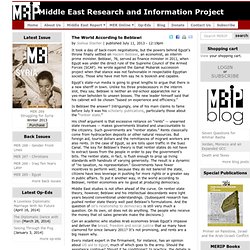
Beblawi, 76, served as finance minister in 2011, when Egypt was under the direct rule of the Supreme Council of the Armed Forces (SCAF). He wrote against the Gamal Mubarak succession project when that stance was not fashionable in respectable Egyptian society. Those who have met him say he is bookish and capable. The Necessity of Revolutionary Violence in Egypt. “All politics is a struggle for power; the ultimate kind of power is violence.” - C.
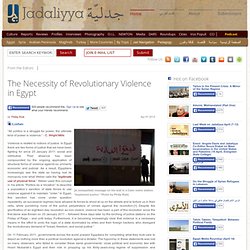
Wright Mills Violence is related to notions of justice. In Egypt there are two forms of justice that we have been fighting for since 25 January 2011: social and retributive. Their absence has been compounded by the ongoing application of structural forms of violence against us: primarily economic and judicial. As a result, Egyptians increasingly see the state as having lost its monopoly over what Weber calls the “legitimate use of physical force.” On 11 February 2011, governments across the world praised Egyptians for completing what they took care to depict as nothing more than a political revolution against a dictator. In Egypt, this moment was the July 1952 “Free Officers’ Revolution,” to which military generals pay tribute to this day in order to bolster their position of power in national politics.
Muslim Brotherhood’s Words on Women Stir Liberal Fears. “A woman needs to be confined within a framework that is controlled by the man of the house,” Osama Yehia Abu Salama, a Brotherhood family expert, said of the group’s general approach, speaking in a recent seminar for women training to become marriage counselors.
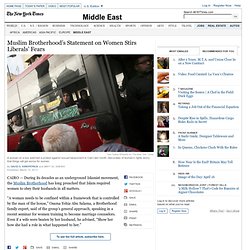
Even if a wife were beaten by her husband, he advised, “Show her how she had a role in what happened to her.” “If he is to blame,” Mr. Hazem Kandil · Deadlock in Cairo · LRB 21 March 2013. The Egyptian revolt is trapped in a balance of weakness.
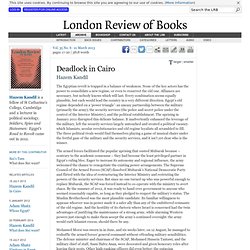
None of the key actors has the power to consolidate a new regime, or even to resurrect the old one. Alliances are necessary, but nobody knows which will last. Every combination seems equally plausible, but each would lead the country in a very different direction. Egypt’s old regime depended on a ‘power triangle’: an uneasy partnership between the military (primarily the army), the security services (the police and secret police under the control of the Interior Ministry), and the political establishment. The uprising in January 2011 disrupted this delicate balance. The armed forces facilitated the popular uprising that ousted Mubarak because – contrary to the academic consensus – they had become the least privileged partner in Egypt’s ruling bloc.
Mohamed Morsi was sworn in in June, and six weeks later, on 12 August, he managed to reshuffle the armed forces’ general command without offending military sensibilities. 8 March. The Odor of Things. Tahrir Square in 1962.
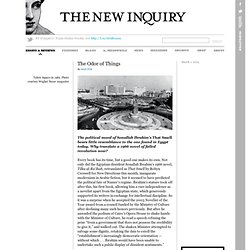
Photo courtesy Weghat Nazar magazine The political mood of Sonallah Ibrahim’s That Smell bears little resemblance to the one found in Egypt today. Why translate a 1966 novel of failed revolution now? Every book has its time, but a good one makes its own. Not only did the Egyptian dissident Sonallah Ibrahim’s 1966 novel, Tilka al-Ra’ihah, retranslated as That Smell by Robyn Creswell for New Directions this month, inaugurate modernism in Arabic fiction, but it seemed to have predicted the political fate of Nasser’s regime. This essay appears in TNI Vol. 14: Time. Brothers and Officers: A History of Pacts.